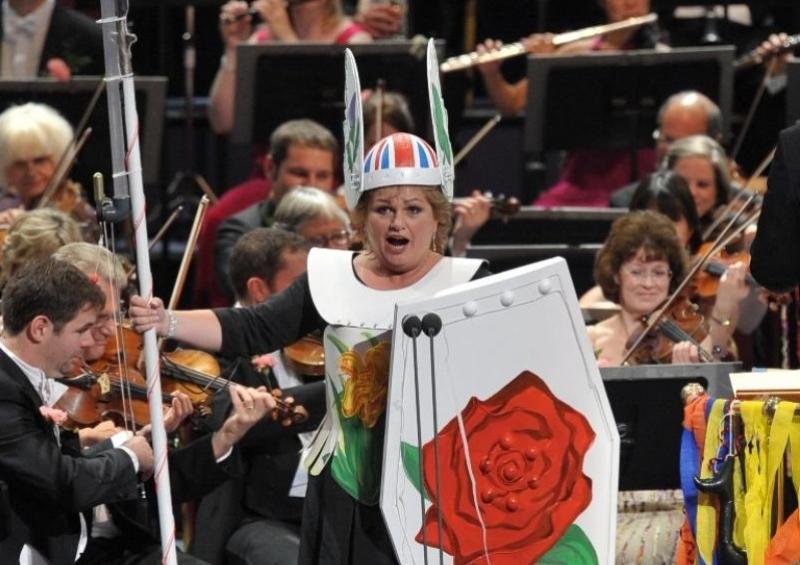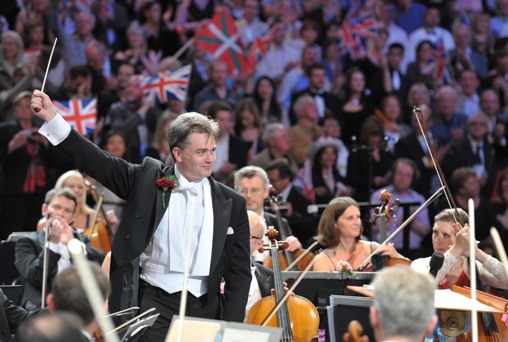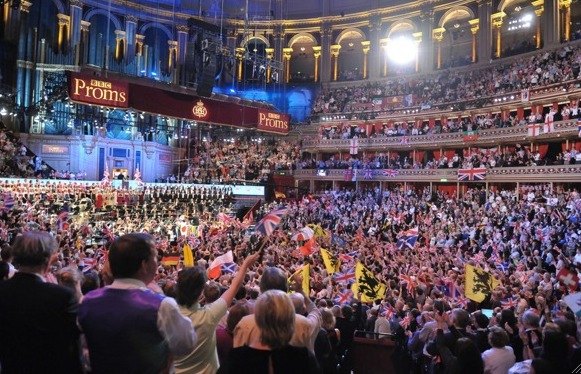The Last Night of the Proms, Bullock, Lang Lang, BBCSO, Gardner | reviews, news & interviews
The Last Night of the Proms, Bullock, Lang Lang, BBCSO, Gardner
The Last Night of the Proms, Bullock, Lang Lang, BBCSO, Gardner
Night of quality music-making - but phooey to the flags

Stately females sailed the corridors like grand multicoloured liners. Grown men in boaters and Union Jack waistcoats raced balloons to the Royal Albert Hall ceiling. Beachballs. Streamers. Flags. Fancy dress. One St George's Cross read "Votes for Women!" My first thoughts were: how lovely, in a way, that the mentally ill are allowed a day out like this.
It does strange things to you, does the Last Night. Most amazingly strange was what it did to Lang Lang. His performance of Liszt's First Piano Concerto lacked all the customary vulgarity. Technical precision was from the start giving way to abandon. Theatrical effect was springing up not from the dictates of an ingratiating ego but from the Gothic demands of a crazy concerto. The impish battle that the piano has with the orchestra and the silences that pit the part gave us some of the most breathtaking moments: scampering en pointe triplets in the Allegretto vivace, spinning-plate trills, machine-gunned octaves.
 He made the tinsel sparkle, yet also provided a compelling Quasi adagio, thinning out the sound to a thrillingly risky degree, and interestingly over-pedalling the final descent. The orchestra responded sensitively, the flute of the BBC Symphony Orchestra giving a charming melodic nod of approval. For the first time ever, Lang Lang seemed ready and able to give a reason for every glistening run, a purpose to every pounce.
He made the tinsel sparkle, yet also provided a compelling Quasi adagio, thinning out the sound to a thrillingly risky degree, and interestingly over-pedalling the final descent. The orchestra responded sensitively, the flute of the BBC Symphony Orchestra giving a charming melodic nod of approval. For the first time ever, Lang Lang seemed ready and able to give a reason for every glistening run, a purpose to every pounce.
Following a Grande polonaise brilliante, Chopin's Op 22, that had plenty of Polish attack but perhaps a touch too little swagger, we were given not the usual flashy party piece but something quite different and unexpected, the introverted hush of Liszt's Consolation No 3. It was subtle and modest, reeling us in again on a pianissimo that refused to let us go until the final dying notes. Was this the rebirth of Lang Lang as a serious artist? Hammerklavier next, please, just to be sure.
The first half saw plenty of quality music-making. Gardner's (pictured above right) performance of Bartók's suite of The Miraculous Mandarin revealed an orchestra not done in by festival fatigue. The solo woodwind capering that feeds into a larger, more demonic dance was the start of the official festivities and would have suited a Last Night bobbing - though no one tried.
Grainger's arrangement of "Mo nighean dubh" made the soul sob
Susan Bullock's impeccable delivery of the Immolation Scene from Götterdämmerung was the thing that gave the evening its greatest musical weight. From her robustly rolled German to her floating vowels that seemed to span that final bridge to fiery eternity, Bullock's performance was without fault. Could it have had a little more life? A little less static authority? Possibly. But vocal control doesn't get better than this. Odd then that she should be so bizarrely outwitted by the leaps of "Climb ev'ry mountain". Only Bullock could make Wagner look like a breeze, and Rodgers a trial.
 Wendy Cope's rewriting of the accompanying text to Britten's Young Person's Guide should have been a highlight but fell oddly flat. Contrary to everything Cope's poetry normally stands for, the versifying was prolix, witless and clumsy, and in the theatrical mouth of Jenny Agutter, over-performed. In talking to children one should never need to patronise. Ho hum. Tears fell in Grainger's short, tender-hearted interjection, a folk-song arrangement for chorus of "Mo nighean dubh" ("My dark-haired maiden"). A little more Scottish accenting from the otherwise excellent BBC Symphony Chorus mightn't have gone amiss. Yet, still, they made the soul sob.
Wendy Cope's rewriting of the accompanying text to Britten's Young Person's Guide should have been a highlight but fell oddly flat. Contrary to everything Cope's poetry normally stands for, the versifying was prolix, witless and clumsy, and in the theatrical mouth of Jenny Agutter, over-performed. In talking to children one should never need to patronise. Ho hum. Tears fell in Grainger's short, tender-hearted interjection, a folk-song arrangement for chorus of "Mo nighean dubh" ("My dark-haired maiden"). A little more Scottish accenting from the otherwise excellent BBC Symphony Chorus mightn't have gone amiss. Yet, still, they made the soul sob.
And let's not forget the thoughtful opening fanfare from Sir Peter Maxwell Davies, Musica benevolens, that brought the hall into communal prayer. In monophonic unison we recited a newly created credo. Military trumpets (in honour of the fallen) joined the hall's calls. The orchestra broke up the choral and audience antiphons with the abrasive language of Hindemith and Weill, allowing the melancholy and anger that is usually so thoroughly ignored by fanfares to make its presence felt.
My problem is not that the Last Night contains too much patriotism
Despite all this, I hung my head in shame as the evening turned to the flag-powered singing. My problem is not that the Last Night contains too much patriotism. The problem is that it doesn't contain enough. When the Royal Albert Hall comes together for "Land of Hope and Glory" and "God Save the Queen", we are not conversing in an act of national self-confidence, we are engaging in a kitsch expression of eccentric cuteness.
"God Save the Queen" and "Land of Hope and Glory" are sung today only because they have been desacralised, castrated of their true consequence, their significance watered down, their selfless ideals scooped out. This is why we can accept the absurdity of large Chinese Communist flags waving in sympathy to the songs. Because they are meaningless. That these pungent, powerful works have now become harmless dildos - impotent toys of self-pleasuring campery - is where the offence lies and why the Last Night will never interest a true patriot.
Share this article
Add comment
The future of Arts Journalism
You can stop theartsdesk.com closing!
We urgently need financing to survive. Our fundraising drive has thus far raised £49,000 but we need to reach £100,000 or we will be forced to close. Please contribute here: https://gofund.me/c3f6033d
And if you can forward this information to anyone who might assist, we’d be grateful.

Subscribe to theartsdesk.com
Thank you for continuing to read our work on theartsdesk.com. For unlimited access to every article in its entirety, including our archive of more than 15,000 pieces, we're asking for £5 per month or £40 per year. We feel it's a very good deal, and hope you do too.
To take a subscription now simply click here.
And if you're looking for that extra gift for a friend or family member, why not treat them to a theartsdesk.com gift subscription?
more Classical music
 Hallé John Adams festival, Bridgewater Hall / RNCM, Manchester review - standing ovations for today's music
From 1980 to 2025 with the West Coast’s pied piper and his eager following
Hallé John Adams festival, Bridgewater Hall / RNCM, Manchester review - standing ovations for today's music
From 1980 to 2025 with the West Coast’s pied piper and his eager following
 Kaploukhii, Greenwich Chamber Orchestra, Cutts, St James's Piccadilly review - promising young pianist
A robust and assertive Beethoven concerto suggests a player to follow
Kaploukhii, Greenwich Chamber Orchestra, Cutts, St James's Piccadilly review - promising young pianist
A robust and assertive Beethoven concerto suggests a player to follow
 Robin Holloway: Music's Odyssey review - lessons in composition
Broad and idiosyncratic survey of classical music is insightful but slightly indigestible
Robin Holloway: Music's Odyssey review - lessons in composition
Broad and idiosyncratic survey of classical music is insightful but slightly indigestible
 Classical CDs: Wolf-pelts, clowns and social realism
British ballet scores, 19th century cello works and contemporary piano etudes
Classical CDs: Wolf-pelts, clowns and social realism
British ballet scores, 19th century cello works and contemporary piano etudes
 Bizet in 150th anniversary year: rich and rare French offerings from Palazzetto Bru Zane
Specialists in French romantic music unveil a treasure trove both live and on disc
Bizet in 150th anniversary year: rich and rare French offerings from Palazzetto Bru Zane
Specialists in French romantic music unveil a treasure trove both live and on disc
 Scottish Chamber Orchestra, Ibragimova, Queen’s Hall, Edinburgh review - rarities, novelties and drumrolls
A pity the SCO didn't pick a better showcase for a shining guest artist
Scottish Chamber Orchestra, Ibragimova, Queen’s Hall, Edinburgh review - rarities, novelties and drumrolls
A pity the SCO didn't pick a better showcase for a shining guest artist
 Kilsby, Parkes, Sinfonia of London, Wilson, Barbican review - string things zing and sing in expert hands
British masterpieces for strings plus other-worldly tenor and horn - and a muscular rarity
Kilsby, Parkes, Sinfonia of London, Wilson, Barbican review - string things zing and sing in expert hands
British masterpieces for strings plus other-worldly tenor and horn - and a muscular rarity
 From Historical to Hip-Hop, Classically Black Music Festival, Kings Place review - a cluster of impressive stars for the future
From quasi-Mozartian elegance to the gritty humour of a kitchen inspection
From Historical to Hip-Hop, Classically Black Music Festival, Kings Place review - a cluster of impressive stars for the future
From quasi-Mozartian elegance to the gritty humour of a kitchen inspection
 Shibe, LSO, Adès, Barbican review - gaudy and glorious new music alongside serene Sibelius
Adès’s passion makes persuasive case for the music he loves, both new and old
Shibe, LSO, Adès, Barbican review - gaudy and glorious new music alongside serene Sibelius
Adès’s passion makes persuasive case for the music he loves, both new and old
 Anja Mittermüller, Richard Fu, Wigmore Hall review - a glorious hall debut
The Austrian mezzo shines - at the age of 22
Anja Mittermüller, Richard Fu, Wigmore Hall review - a glorious hall debut
The Austrian mezzo shines - at the age of 22
 First Person: clarinettist Oliver Pashley on the new horizons of The Hermes Experiment's latest album
Compositions by members of this unusual quartet feature for the first time
First Person: clarinettist Oliver Pashley on the new horizons of The Hermes Experiment's latest album
Compositions by members of this unusual quartet feature for the first time

Comments
...
...
...
...
...
...